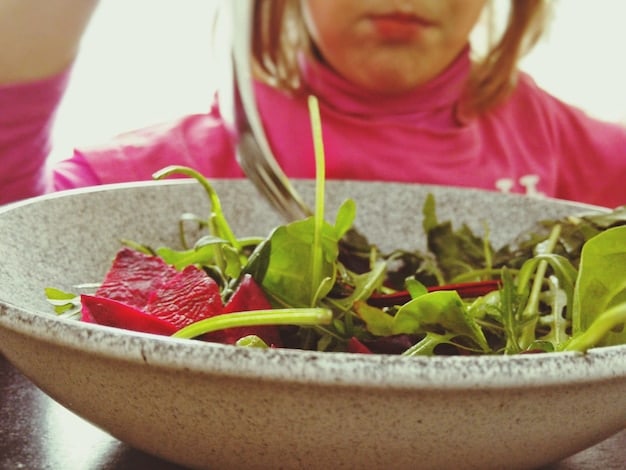Mindful Eating in 2025: Savor Meals & Improve Digestion

Mindful eating in 2025 emphasizes a holistic approach to nutrition, focusing on savoring each meal, understanding hunger cues, and improving digestion through conscious food choices and mindful practices, leading to a healthier and more enjoyable relationship with food.
Imagine a world where every meal is a moment of peace, a celebration of flavors, and a step towards better health. That’s the promise of mindful eating in 2025: A step-by-step guide to savoring your meals and improving digestion.
What is Mindful Eating?
Mindful eating is more than just paying attention to what you eat; it’s about being fully present with your food, engaging all your senses, and understanding your body’s hunger and fullness cues. It’s a practice that can transform your relationship with food, turning meals into opportunities for nourishment and enjoyment.
In a world of fast food and constant distractions, mindful eating offers a refreshing alternative: a way to slow down, appreciate your food, and cultivate a healthier body and mind.
The Core Principles of Mindful Eating
Mindful eating is built on several key principles that help you develop a deeper understanding of your eating habits and make more conscious choices.
- Awareness: Paying attention to the present moment without judgment, noticing the colors, textures, smells, and tastes of your food.
- Acceptance: Acknowledging your hunger and cravings without guilt or shame, understanding that they are natural responses.
- Non-Judgment: Observing your thoughts and feelings about food without criticism, allowing yourself to enjoy your meals without restriction.
- Compassion: Treating yourself with kindness and understanding, recognizing that everyone makes mistakes and that it’s okay to indulge occasionally.
By incorporating these principles into your eating habits, you can begin to transform your relationship with food and develop a more balanced and healthy approach to eating.
Mindful eating isn’t about dieting or restricting yourself; it’s about creating a positive and sustainable relationship with food that supports your overall well-being. It encourages you to listen to your body, appreciate your meals, and make choices that nourish you both physically and emotionally. Food should be a celebration and not a constant worry.
Why Mindful Eating Matters in 2025
In 2025, with technology ever-present and lives becoming increasingly hectic, mindful eating is more relevant than ever. It serves as a counterbalance to the fast-paced nature of modern life, providing a way to reconnect with ourselves and our food. Prioritizing mindful eating leads to sustainable health habits.
It’s a way to escape from the constant distractions and pressures of modern life and to find moments of peace and pleasure in the simple act of eating.

Combating the Effects of Stress and Anxiety
Mindful eating can be a powerful tool for managing stress and anxiety. By slowing down and paying attention to your food, you can reduce the physiological effects of stress, such as increased heart rate and shallow breathing.
Mindful eating teaches you to recognize when you’re eating out of emotional need rather than genuine hunger. Creating healthy habits will help you make better choices, even if you are stressed or anxious.
- Identify triggers that lead to emotional eating.
- Practice relaxation techniques like deep breathing or meditation.
- Engage in activities that bring joy and reduce stress.
When you understand the difference between physical and emotional hunger, you free yourself from the grip of emotional habits.
Mindful eating is not just about the food; it’s about the entire experience. It’s about creating a positive and supportive environment for eating, free from distractions and negativity.
Step-by-Step Guide to Mindful Eating
Embarking on a mindful eating journey doesn’t require drastic changes. It’s about incorporating small, deliberate practices into your daily routine. Start by implementing a few of these steps and gradually build from there.
With a little practice and patience, you can transform your relationship with food and experience the many benefits of mindful eating.
Step 1: Create a Calm Eating Environment
The environment in which you eat can have a significant impact on your eating habits. A calm and peaceful setting can help you slow down and pay better attention to your food.
Take the time to set the stage for a mindful meal, free from distractions and stress.
- Turn off electronic devices such as TVs, phones, and computers.
- Choose a quiet and comfortable space where you can relax and focus on your meal.
- Use pleasant lighting and a comfortable seating arrangement.
These small changes can make a big difference in your overall eating experience. Creating a calm environment sets the stage for mindful, intentional eating.
Creating a pleasant atmosphere is not about perfection; it’s about intention. It’s about signaling to yourself that this meal is important and that you deserve to enjoy it without distractions.
Mindful Eating for Better Digestion
One of the significant benefits of mindful eating is improved digestion. When you eat mindfully, you chew your food more thoroughly, which aids in the breakdown of nutrients and eases the burden on your digestive system.
Better digestion leads to improved nutrient absorption, reduced bloating, and a more comfortable eating experience. By being mindful of how you eat, you can support your digestive health and overall well-being.
Chewing Your Food Thoroughly
Chewing food thoroughly is an essential aspect of mindful eating. It not only helps with digestion but also allows you to savor the flavors and textures of your food more fully.
The goal is to break down the food into smaller particles, making it easier for your stomach to digest.
- Count each chew, aiming for at least 20-30 chews per bite.
- Pay attention to the textures and flavors that are released as you chew.
- Swallow only when the food is completely broken down.
Chewing thoroughly also gives your brain time to register fullness, preventing overeating. It’s a simple yet powerful practice that can transform your eating habits.
Chewing our food thoroughly is important, as is taking smaller bites to ensure proper saturation and enjoyment of our meals.

Overcoming Common Obstacles
Like any new practice, mindful eating can present challenges, especially in the beginning. It’s important to recognize these obstacles and develop strategies to overcome them.
With the right approach, you can navigate these challenges and continue to make progress on your mindful eating journey. With patience and perseverance, you can overcome these hurdles and cultivate a more mindful and enjoyable relationship with food.
Dealing with Time Constraints
One of the most common obstacles to mindful eating is lack of time. Many people feel rushed during meals, which can make it difficult to slow down and pay attention to their food.
However, even small changes can make a big difference.
- Schedule dedicated meal times in your calendar.
- Prepare meals in advance to avoid feeling rushed.
- Even if you only have a few minutes, take a few deep breaths and focus on your food.
Remember that mindful eating is not about perfection; it’s about intention. Even if you can’t always eat mindfully, making a conscious effort to do so when possible can have a positive impact.
Remember that mindful eating is not an all-or-nothing practice. It’s about making small, sustainable changes that fit into your lifestyle. The benefits of mindful eating extend far beyond the plate.
Tracking Your Progress and Staying Motivated
To make mindful eating a sustainable habit, it’s important to track your progress and find ways to stay motivated. This can help you stay on track and celebrate your successes along the way.
Tracking your progress will keep you accountable for your health journey. This constant awareness is the most beneficial aspect of mindful eating.
- Keep a food journal to record your meals, thoughts, and feelings.
- Set realistic goals and celebrate your achievements.
- Find a support system of friends or family who are also practicing mindful eating.
Remember that progress is not always linear. There will be times when you struggle, but it’s important to be patient and compassionate with yourself.
Success can happen slowly, and it’s vital to be aware that the journey is much more important than the destination. Stay on track, do your best, and track consistently to achieve mindful eating.
| Key Point | Brief Description |
|---|---|
| 🧘♀️ Awareness | Pay attention to your food without judgment. |
| 🍽️ Calm Environment | Eat in a quiet place, free from distractions. |
| 🍎 Chewing | Thoroughly chew each bite to aid digestion. |
| ⏱️ Time | Schedule dedicated meals, prepare in advance. |
Frequently Asked Questions
▼
The main goal is to develop a healthier, more conscious relationship with food by paying attention to your body’s cues and savoring each eating experience without distractions or judgment.
▼
Mindful eating promotes better digestion by encouraging thorough chewing and slower eating, which helps break down food more effectively and reduces stress on the digestive system.
▼
While not a weight-loss diet, mindful eating can aid in weight management by increasing awareness of hunger and fullness cues, preventing overeating, and promoting healthier food choices.
▼
Even in a packed day, remove distractions like phones, spend 2 minutes breathing before eating and focus on texture and colors, and chew slowly.
▼
Yes, mindful eating is suitable for everyone, including those with dietary restrictions as it focuses on the mental and emotional aspects of eating, not specifically on what foods are consumed.
Conclusion
As we look towards 2025, the practice of **mindful eating** offers a pathway to not only savor our meals but also enhance our overall well-being. By embracing this approach, we can transform our relationship with food, improve digestion, and cultivate a deeper sense of connection with ourselves, contributing to a healthier and more balanced future.





